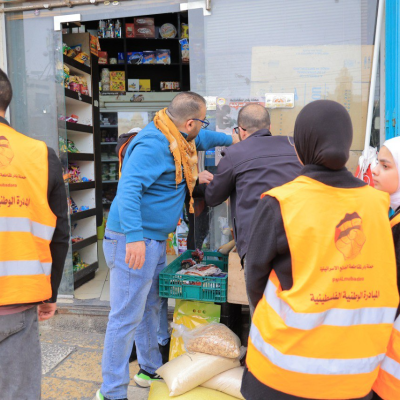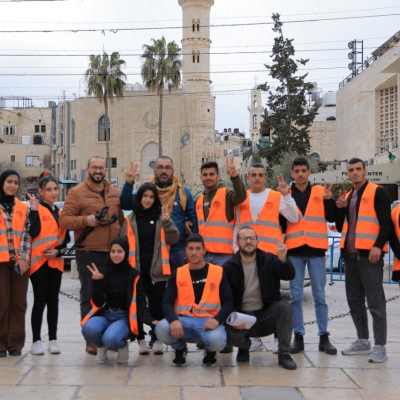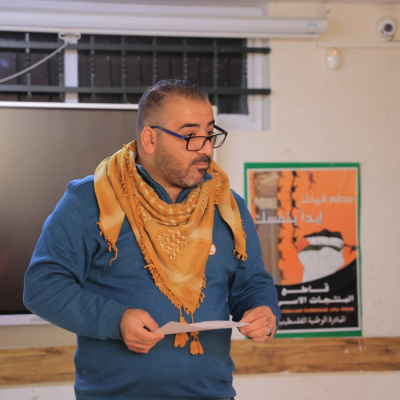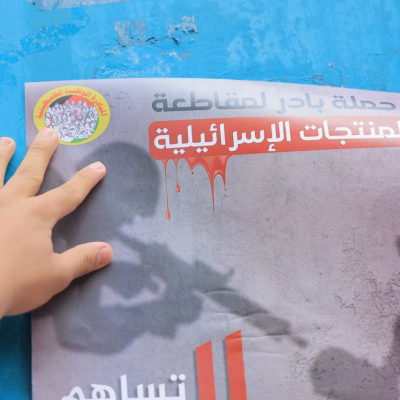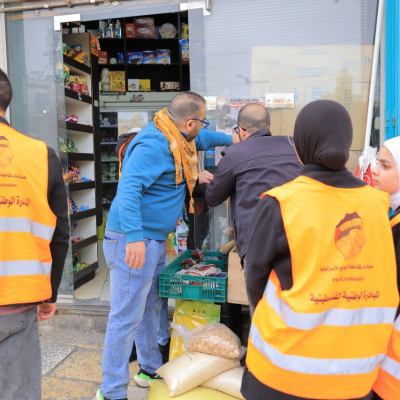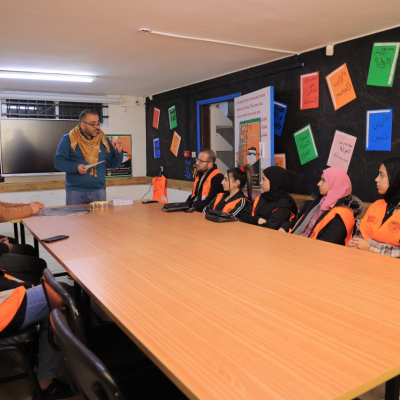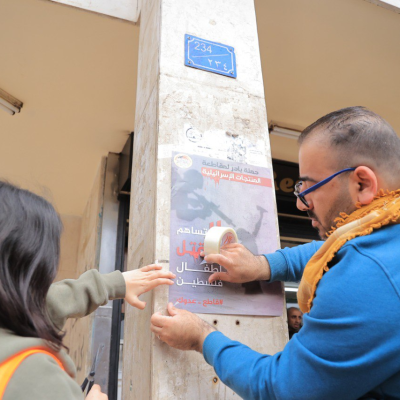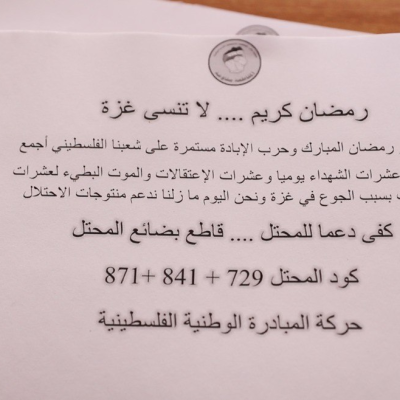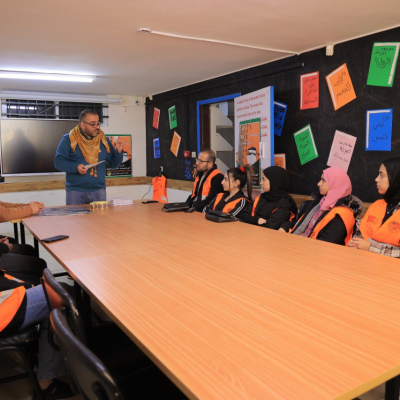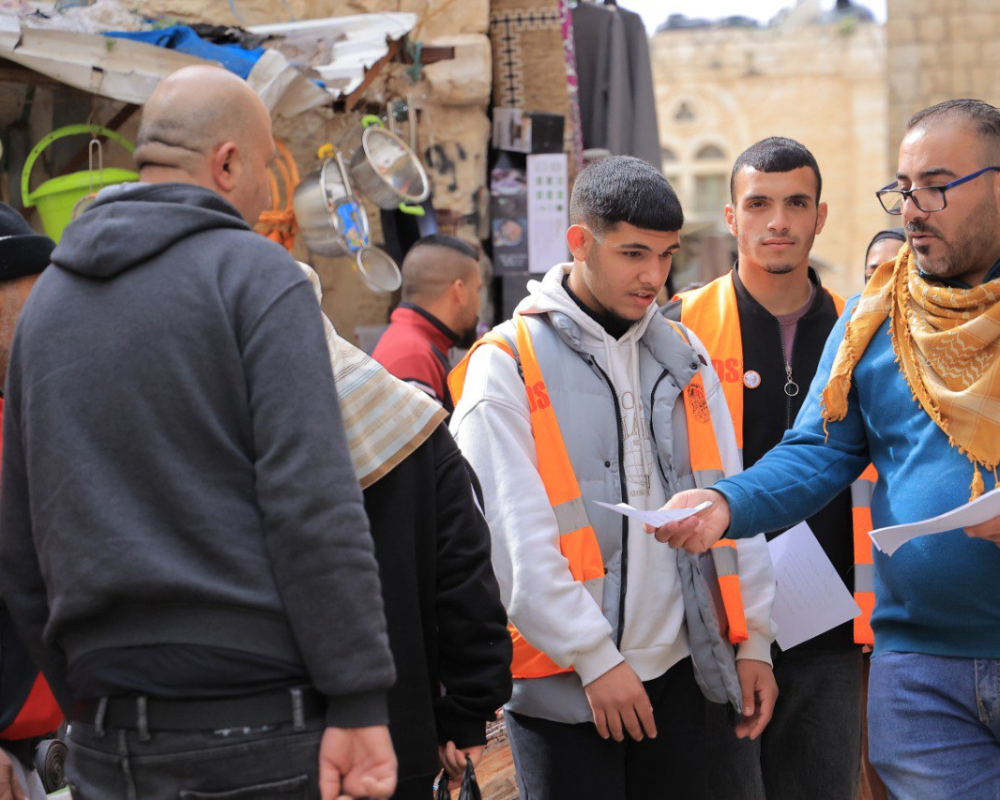
Bethlehem / PNN /
Campaigns boycotting Israeli products are considered one of the tools adopted by Mohammed Bashir, an activist in the Popular Resistance Committees, as a means of confronting and fighting Israeli occupation on an important front, namely the economic front that funds Israel's wars on the Palestinian people in all its forms, whether military, targeting Palestinians as in the Gaza genocide, or its political and racist programs targeting land for the construction of more settlements.
Bashir says he has been seeking to promote boycotting Israeli products since 2009, believing that boycotting is part of resistance to Israeli occupation, as well as supporting Palestinian local products that strengthen our national economy.
Mohammed Bashir aims to promote the concept and culture of resistance through holding lectures and workshops on the importance of boycotting Israeli products in Palestinian society. He delivers weekly lectures to university and school students, raising awareness among the young Palestinian generation about the importance of the boycott and its impact on the Israeli economy by boycotting Israeli and international companies that support Israel.
Mohammed explains to students that any occupation relies primarily on the economy to strengthen its presence, and the most significant factor weakening the occupation until its end is the economy. He expresses regret over our Palestinian market, the second source of income for the occupation at $3 billion annually, being the largest income after arms trade.
Mohammed Bashir, a founder of the "Start with Yourself" campaign, urges young people to promote the culture of boycotting products by starting with themselves. He emphasizes the need for individual Palestinians to participate in this form of popular resistance and to be distinguished by it, supporting our Palestinian products and stopping support for the occupation by refraining from purchasing their goods. He stresses that boycotting Israeli products is a form of national dignity that we must embrace and commit to.
Bashir states that the Boycott, Divestment, and Sanctions (BDS) movement worldwide and the boycott campaigns within Palestine have one goal: to pressure Israel. He notes extensive coordination between those leading the campaigns, indicating that the achievements of the boycott campaigns and imposing sanctions on Israel, known as BDS, and Palestinian campaigns, including the "Start with Yourself" campaign, have had significant impact on the Israeli economy.
He further asserts that boycotting is a powerful weapon, recognized and feared by the occupation to the extent that activists and believers in the boycott are often subject to security bans by the occupation, preventing them from traveling. This is the strongest evidence that boycotting affects the occupation, as indicated by the ministry specifically formed by the occupation to counter the BDS campaign.
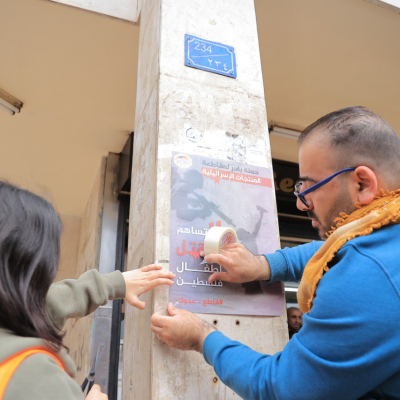
Field Campaigns in Markets to Promote Boycotting
From time to time, Mohammed and his group conduct field activities and campaigns, including tours of commercial stores to talk to merchants and citizens alike about the necessity of boycotting Israeli products. They distribute informational leaflets to raise awareness among citizens in the streets, especially during Ramadan. Members of the "Start with Yourself" campaign also put stickers on Israeli products to alert shoppers to the risks of purchasing these products from stores.
Bashir explains that market tours raise citizens' awareness about the risks of buying Israeli products, pointing out that boycotting makes the occupation lose, in addition to increasing the level of true national awareness among people. It solidifies the idea of starting with oneself, showing that individuals can have an impact. Furthermore, boycotting products is a weapon that is difficult to hold individuals accountable for, as the occupation cannot arrest or prosecute someone for refusing to buy their products.
Ayyham Ali, a Palestinian university student, participating in the campaign to promote the culture of boycotting, believes that boycotting contributes to the loss of the occupation's economy. He adds that it is necessary to write on products and identify their source, so that we see the number 972, indicating that these products are Israeli, and consequently leave them and support Arab Palestinian goods by purchasing them.
From her perspective, Bayan Issa, a young member of the "Start with Yourself" campaign to boycott Israeli products, says she participated in the campaign because she does not want Palestinians to contribute to paying the price of bullets and shells fired at our people in Gaza. She has learned that Israeli companies allocate large shares of their profits to supply the needs of the Israeli army with weapons.
Obstacles to Boycotting in Palestine Met with Determination to Raise Awareness for Compensation
Bashir explains that some obstacles facing boycott campaigns in Palestinian territories include the capitalist mindset of some traders who prevent the spread of the boycott idea because they are only interested in sales and profits. If Israeli products bring them more profit, they do not hesitate to stock them.
Another obstacle facing boycotts in Palestine is the Palestinian Authority's failure to make decisions to ban Israeli products from entering the local Palestinian markets due to its commitments to economic agreements like the Paris Agreement, which restricts the Palestinian economy, thus contributing to the presence of Israeli products in Palestinian markets. These issues drive boycott campaign activists to rely on merchant mentality and culture, where they have achieved actual accomplishments by persuading some traders to remove Israeli goods from their shelves.
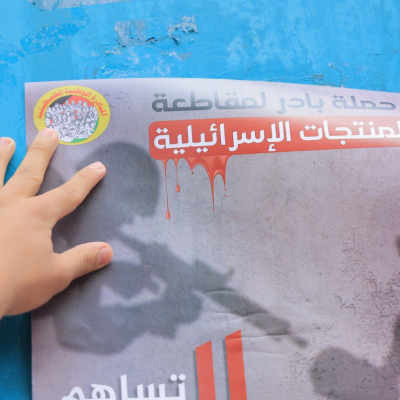
In this context, Fuad Hammad Abu Abdullah, the owner of a supermarket in Bethlehem, states that he stopped selling Israeli products, especially after the outbreak of the genocide war and even before it. Prior to the war, he did not sell Israeli products that had Palestinian alternatives and were imported. However, after the war, he stopped selling any Israeli products in his store.
Abu Abdullah says that these Israeli products finance campaigns of destruction and killing carried out by the Israeli army, and therefore everyone should boycott them.
He further states that anyone who buys an Israeli product during the genocide war practiced by the occupation against our Palestinian people in Gaza serves the occupation, asking why we should wait for more than 35,000 martyrs in Gaza and 450 martyrs in the West Bank since October 7th while we are still discussing the issue of boycotting.
Returning to activist Bashir, he believes that these examples of young people, girls, and traders who respond to boycott campaigns are models to be followed because they adopt and believe in the idea of boycotting. He explains that the new generation believes in and works for boycotting more than previous generations, as young people who receive training and guidance on the boycott process have become a real monitoring force for their families, guiding them to buy national products.
He emphasizes that one of the most important achievements is that the new generation has become a real barrier and obstacle to the spread of Israeli products, as no Israeli product is seen in school canteens or universities from the northernmost to the southernmost part of the West Bank. He highlights the significant awareness that everyone now possesses, attributing it to the youth who believe in the concept of boycotting.
Bashir confirms that they have managed to implement 14 campaigns in recent years, starting with targeting specific products and now reaching the stage of boycotting all Israeli products that have Palestinian, Arab, or foreign alternatives, except American products because the United States supports Israel, and its products should also be boycotted.
This story was produced as part of the "Qareeb" program implemented by the French Agency for Media Development (CFI) in partnership with funding from the French Agency for International Cooperation (AFD).
